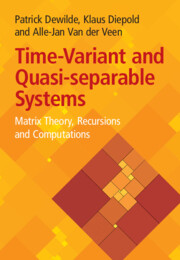Book contents
- Frontmatter
- Contents
- Preface
- Acknowledgements
- Part I Lectures on Basics with Examples
- 1 A First Example: Optimal Quadratic Control
- 2 Dynamical Systems
- 3 LTV (Quasi-separable) Systems
- 4 System Identification
- 5 State Equivalence, State Reduction
- 6 Elementary Operations
- 7 Inner Operators and External Factorizations
- 8 Inner−Outer Factorization
- 9 The Kalman Filter as an Application
- 10 Polynomial Representations
- 11 Quasi-separable Moore−Penrose Inversion
- Part II Further Contributions to Matrix Theory
- Appendix: Data Model and Implementations
- References
- Index
5 - State Equivalence, State Reduction
from Part I - Lectures on Basics with Examples
Published online by Cambridge University Press: 24 October 2024
- Frontmatter
- Contents
- Preface
- Acknowledgements
- Part I Lectures on Basics with Examples
- 1 A First Example: Optimal Quadratic Control
- 2 Dynamical Systems
- 3 LTV (Quasi-separable) Systems
- 4 System Identification
- 5 State Equivalence, State Reduction
- 6 Elementary Operations
- 7 Inner Operators and External Factorizations
- 8 Inner−Outer Factorization
- 9 The Kalman Filter as an Application
- 10 Polynomial Representations
- 11 Quasi-separable Moore−Penrose Inversion
- Part II Further Contributions to Matrix Theory
- Appendix: Data Model and Implementations
- References
- Index
Summary
In this chapter, we consider the central issue of minimality of the state-space system representation, as well as equivalences of representations. The question introduces important new basic operators and spaces related to the state-space description. In our time-variant context, what we call the Hankel operator plays the central role, via a minimal composition (i.e., product), of a reachability operator and an observability operator. Corresponding results for LTI systems (a special case) follow readily from the LTV case. In a later starred section and for deeper insights, the theory is extended to infinitely indexed systems, but this entails some extra complications, which are not essential for the main, finite-dimensional treatment offered, and can be skipped by students only interested in finite-dimensional cases.
Information
- Type
- Chapter
- Information
- Time-Variant and Quasi-separable SystemsMatrix Theory, Recursions and Computations, pp. 73 - 86Publisher: Cambridge University PressPrint publication year: 2024
